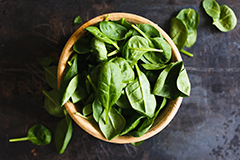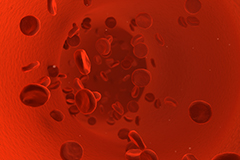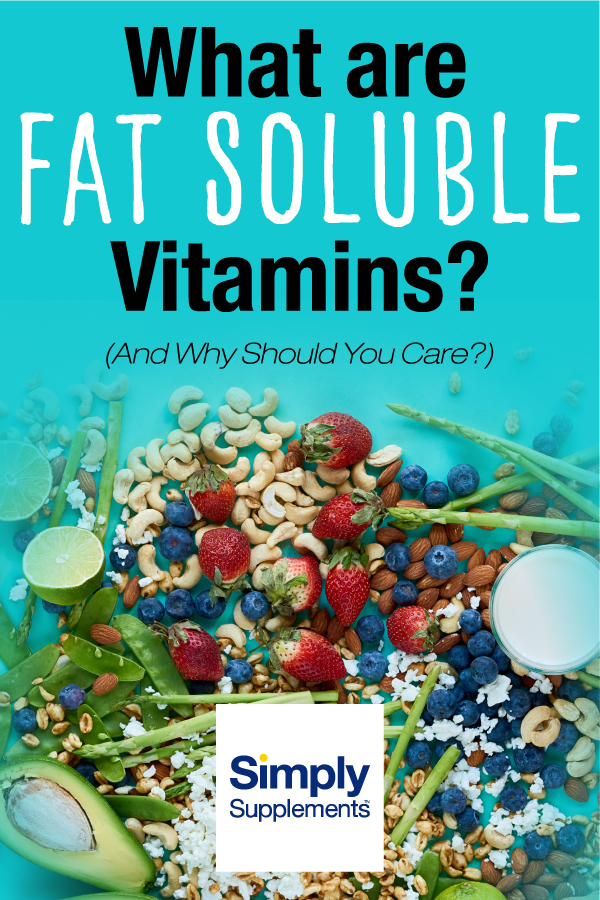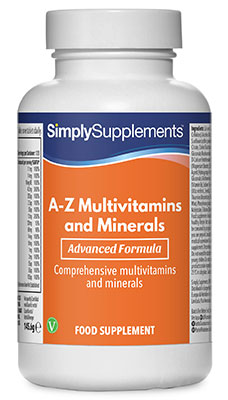What are Fat-Soluble Vitamins?

The vitamins that our body needs can be divided into two groups; those that dissolve in water and those that dissolve in fat. As the name suggests, fat-soluble vitamins are those that dissolve in fats. But what does this mean in practice?
What Makes Fat-Soluble Vitamins Special?
Fat-soluble vitamins are notable because they can be stored in the liver and the fat cells of the body (the “adipose tissue”). They are safely stored until they are required by the body, in contrast to water-soluble vitamins that tend to be eliminated through normal excretion. Consequently, while we should aim to maintain healthy levels of all the various nutrients our body needs, it means that daily supplementation with fat soluble vitamins isn't necessarily essential.
Why Are Fat-Soluble Vitamins More Toxic?
The other important aspect of the body's ability to store fat-soluble vitamins is that they have the potential to build up in the body, leading to toxicity. That said, studies suggest that the human body can tolerate surprisingly high levels of many vitamins, so toxicity that is detrimental to your health is unusual. The message here is that taking more fat-soluble vitamins isn't necessarily always better for you. Instead, always be sure to carefully follow the manufacturer's instructions to ensure optimal levels are held in the body.
What Are the Fat-Soluble Vitamins?
At its most basic there are four fat-soluble vitamins known to scientists. These are vitamins A, D, E and K. We say “at its most basic” because some of these vitamins come in a variety of forms.
How to get Enough Fat-Soluble Vitamins
Fat-soluble vitamins tend to be most common in high-fat foods, meaning that traditional low-fat diets may not contain enough of them. What is more, consuming these vitamins in conjunction with fat helps them to be absorbed more readily by the gut. As a result, if you opt to supplement with fat-soluble vitamins then try to combine them with healthy fats such as avocado, plant-based oils such as olive oil or coconut oil, seeds or nuts.
Why Do We Need-Fat Soluble Vitamins?
Most fat-soluble vitamins cannot be effectively synthesized within the body, and so it is crucial that we consume them regularly either through our diet or via the use of high-quality supplements. Read on to discover what the various fat-soluble vitamins actually do for our health...
Vitamin A
Vitamin A is often known to scientists as “retinol”. While it is possible to consume vitamin A directly in the diet, a secondary source can be through the intake of beta-carotene, which the body turns into vitamin A.
What Does Vitamin A Do?
While vitamin A may not be as well-known as some other nutrients it has a surprisingly diverse range of impacts on the body…
Vision
 Arguably vitamin A's most notable impact is on vision. Vitamin A deficiencies are common in developing nations and it has been estimated that a lack of vitamin A is responsible for up to half a million cases of blindness each year.
Arguably vitamin A's most notable impact is on vision. Vitamin A deficiencies are common in developing nations and it has been estimated that a lack of vitamin A is responsible for up to half a million cases of blindness each year.
Vitamin A acts as a precursor to the pigments used in rod and cone cells in the eye. As a result, it is directly responsible for colour vision and our ability to see in low light levels. Indeed, it has been suggested that one of the most common symptoms of vitamin A deficiency is worsening night vision.
Cell Differentiation
Vitamin A helps to modulate the division of cells in the body. It therefore has a role to play in normal growth and development, and deficiencies can result in stunted growth. The impact of vitamin A on cell division has also made it a major target for scientists studying cancer; essentially a process of unnatural cell division.
In one study 16,000 men were asked to give a blood sample, each of which was kept safe for some years. As some of the original cohort began to contract cancer scientists then began to compare the blood samples between healthy individuals and the cancer victims. They found that low vitamin A in the blood was linked to a much higher risk of cancer, with the relationship between vitamin A and lung cancer being particularly strong.
Immune System
Vitamin A plays a valuable role in supporting the immune system and helping the body to fight infection. In developing nations vitamin A supplementation has been linked to lower cases of illness and even death.
How Much Vitamin A Do I Need?
Like many vitamins, the body only requires modest amounts to remain in optimal health. Current daily recommendations for adults are as follows:
- 0.7mg for men
- 0.6mg for women
Remember that the body can store vitamin A, so it is not necessarily essential to consume these volumes daily.
Vitamin A Deficiencies
Vitamin A deficiencies are reasonably common in developing nations but are far less so in the West. The richest sources of vitamin A in the diet tend to come from animal sources so vegetarians, and especially vegans, may find themselves at risk of deficiencies.
It is also important to mention that suitable zinc is crucial for the mobilization of vitamin A from its storage in the liver. Therefore, even individuals who are consuming enough vitamin A may find they suffer from a deficiency if their diet does not contain suitable levels of this crucial nutrient.
Early symptoms of vitamin A deficiency can include worsening night vision, with more developed cases leading to emaciation, issues with growth and bone development or atrophy of glands.
What Foods Contain Vitamin A?
The richest sources of vitamin A in the diet come from animal sources. These include:
- Cheese
- Eggs
- Oily fish
- Milk
- Yogurt
- Liver (including pate)
Alternatively, a diet rich in sources of beta carotene may enable your body to turn this into the vitamin A that you need. Here brightly-coloured fruits and vegetables come into their own, including:
- Carrots
- Bell peppers
- Sweet potato
- Squashes
- Mango
- Apricots
Please note that studies suggest the vitamin A content of plant-based foods can vary widely by area in which they are grown. If utilizing sources of beta-carotene, therefore, aim to vary your diet significantly to ensure you are consuming suitable volumes.
Alternatively, of course, it is possible to meet your body's daily needs thanks to multivitamins or a specific vitamin A supplement.
Vitamin D
Vitamin D is sometimes known as the “sunshine vitamin” as the body produces it in response to the skin's exposure to natural sunlight.
What Does Vitamin D Do?
It has long been known that suitable access to vitamin D is crucial for the maintenance of a healthy skeleton. This alone is suitable reason to ensure that you're getting enough. Interestingly, more recently a number of other benefits of vitamin D have been discovered by scientists. Here are some of the biggest reasons why you should ensure that you're getting enough vitamin D...
Bones & Teeth
Vitamin D plays a critical role in the regulation of calcium and phosphorus in the body. These two minerals are the building blocks of the skeleton and teeth, and also play a role in the contraction of muscles. While vitamin D is therefore very important for all of us, it plays a particularly beneficial role among those who are at risk of reduced bone mineral density, such as older individuals or ladies undergoing the menopause. By strengthening the skeleton, the risk of breaks and falls reduces significantly.
Mood
Studies suggest that many of us feel much happier during the summer months when compared to grey winter days. This isn't just the weather itself; growing evidence suggests that the vitamin D we get in response to direct sunlight can positively impact our mood. Some experts even believe that a lack of vitamin D may play a role in Seasonal Affective Disorder (SAD).
In one study, experts measured the volume of vitamin D in participants before they underwent a barrage of psychometric tests to assess their mood. The experts found that “in a cross section of older adults vitamin D deficiency was associated with low mood”.
Elsewhere, a study of 31,424 patients compared vitamin D levels in those individuals suffering from depression with a control group. They found that “lower vitamin D levels were found in people with depression compared with controls”.
Immune System
Vitamin D has been shown to inhibit the development of autoimmune diseases. Just as excitingly, recent research suggests that it may also help to reduce the risk of cardiovascular disease (CVD) in later life. A meta-analysis that pooled the results of eight previous scientific studies found that “vitamin D supplements at moderate to high doses may reduce CVD risk”. Lastly, preliminary studies suggest that there is an inverse relationship between vitamin D intake and the risk of contracting breast cancer, though this avenue of research is still in its infancy.
How Much Vitamin D Do I Need?
It is recommended that children over one year of age and adults receive 10mcg of vitamin D per day. Nutritionists even recommend that babies receive vitamin D in order to remain healthy, with those under one year taking a daily dose of 8.5-10mcg.
Vitamin D Deficiencies
Most vitamin D is made in our skin in response to exposure to sunlight. That said, in the more northerly areas such as the UK and Canada it is believed that the sunlight is not of suitable strength during the winter months. As a result, deficiency is possible.
Additionally, some skin types tend to be far less efficient than others at creating vitamin D, with dark-skinned individuals and the elderly being particularly at risk of deficiency.
The current evidence seems to suggest that one of the greatest risks of deficiency is an increased risk of bone fractures. Indeed, studies suggest that a lack of suitable vitamin D can lead to a 12% increase in the risk of bone damage.
Alongside this, results of scientific investigations seem to indicate that vitamin D deficiencies can lead to a generally worse outlook. If you struggle with depression, black moods or SAD then a vitamin D supplement may be advisable during the winter months.
What Foods Contain Vitamin D?
It is important to appreciate that very few foods contain suitable levels of vitamin D. Indeed, one nutritional study claimed that even fortified foods “are often inadequate to satisfy either a child's or an adult's vitamin D requirement”.
The following foods contain higher levels of vitamin D than many other options, and are broadly similar to those offering healthy levels of vitamin A:
- Oily fish
- Red meat
- Liver
- Cheese
- Eggs
It is crucial here to underline that it is very difficult to achieve suitable levels of vitamin D through the diet alone. It is for this reason that the British government currently recommends that we all take a vitamin D supplement during the autumn and winter that provides a daily provision of 10mcg.
Vitamin E
Vitamin E is one of the lesser-known vitamins but plays a crucial role in protecting us from environmental or age-related decline. Interestingly, vitamin E isn't actually a single compound at all, but is the term given to a group of chemicals known as tocopherols and tocotrienols.
What Does Vitamin E Do?
Unlike some of the other fat-soluble vitamins discussed so far, vitamin E does not offer a huge range of different potential health benefits. Instead, its main impact is based on one simple, yet vitally important, element: protection from free radicals...
Free Radical Damage
We are surrounded by “free radicals” - unstable particles that can cause a wealth of damage to the cells of our body. In essence, these free radicals try to “rebalance” themselves by stealing electrons from others. This then causes these “donor” particles to seek their own electrons and so on. This can lead to a “cascade” effect, where numerous cells become damaged in the process. Some experts believe that these free radicals have a part to play in a range of deleterious health conditions, from ageing to the appearance of some cancers.
Another way to describe vitamin E would therefore be to call it “nature's antioxidant” - constantly protecting the body from damage.
Cholesterol Control
One lesser-known role that vitamin E seems to play in the body is that of helping to protect us from cardiovascular disease. High levels of LDL cholesterol are closely associated with the onset of atherosclerosis, which in turn is a risk factor for cardiovascular issues such as heart attacks. Interestingly, studies suggest that oxidised LDL cholesterol - that which has been attacked by free radical damage - seems to pose a greater risk of atherosclerosis.
One large-scale study in women found “a risk of major coronary disease among women who took vitamin E supplements that was about 40 percent lower than the risk in women who did not take these supplements”.
How Much Vitamin E Do I Need?
The daily recommended intake of vitamin E is currently:
- 4mg for men
- 3mg for women
Vitamin E Deficiencies
Vitamin E is common in a range of different foods, so deficiency is quite uncommon. At the same time, even when individuals are deficient in vitamin E very few symptoms may be experienced. Indeed, current evidence seems to suggest that issues only arise as a result of malabsorption of fats thanks to more serious health conditions.
What Foods Contain Vitamin E?
 As with other fat-soluble vitamins, vitamin E is generally found in foods rich in healthy (unsaturated) fats. Some of the best sources of vitamin E include:
As with other fat-soluble vitamins, vitamin E is generally found in foods rich in healthy (unsaturated) fats. Some of the best sources of vitamin E include:
- Nuts & Seeds - such as almonds and sunflower seeds
- Plant Oils - such as olive oil
- Sweet potato
- Butternut squash
- Spinach
- Oily fish - such as trout
Vitamin K
Vitamin K was first discovered in 1934 when it was noticed that specific diets led to excessive bleeding. Today vitamin K is known in two forms - vitamin K1 and vitamin K2 - and plays a crucial part in healthy blood clotting.
What Does Vitamin K Do?
Vitamin K is a crucial co-factor in a range of different proteins that play a role in blood clotting. However, this is far from the only benefit offered by this lesser-known vitamin...
Blood Clotting
In the case of vitamin K deficiency the blood may be unable to clot properly. While this may not sound like a serious problem, the impacts can include hemorrhage, bruising and an inability for wounds to heal themselves. Little wonder, then, that vitamin K is considered crucial to our health.
Bone Health
Growing evidence seems to suggest that vitamin K plays an important, though lesser, role in maintaining bone health. Indeed, some experts have pointed out that low dietary intakes of vitamin K can be associated with reduced bone mineral density and, by extension, the increased chance of suffering from fractures.
One such study compared self-reported dietary vitamin K intake with the bone density of adults. The results were surprising, because the analysis reported a direct correlation between vitamin K intake and bone mineral density in women, but no such pattern in men. This may suggest that vitamin K is of particular importance for females worried about bone thinning and weakening.
How Much Vitamin K Do I Need?
 Opinions differ on how much vitamin K you should be aiming to consume. At present the NHS recommends that adults aim for 1mcg of vitamin K for every kilo of bodyweight.
Opinions differ on how much vitamin K you should be aiming to consume. At present the NHS recommends that adults aim for 1mcg of vitamin K for every kilo of bodyweight.
Vitamin K Deficiencies
Vitamin K deficiencies are quite uncommon, but when they do occur the impacts can be serious. The most common impact is an inability to stop bleeding, with all the unpleasant - and potentially fatal - consequences this brings.
It is generally possible to get enough vitamin K thanks to a varied diet, though some medical conditions can result in a deficiency. Heavy use of antibiotics, for example, may affect gut flora, and in doing so affect the vitamin K that they naturally produce.
What Foods Contain Vitamin K?
Vitamin K is available from a wide range of different foods. It is found once again in foods that are naturally high in fat, such as:
- Butter
- Eggs
- Oily fish
- Plant oils
Possibly the best source of all, however, is green leafy vegetables like:
- Kale
- Brussel sprouts
- Cabbage
- Broccoli
Alternatively, of course, it is possible to make use of multivitamins or a specialist vitamin K supplement to ensure optimal levels.
Conclusion
Now you understand exactly what fat-soluble vitamins are, together with both the benefits and potential risks of taking them, you're in a perfect position to maintain your health. Consider adding healthy fats to your diet and/or investing in a good-quality multivitamin (taken at the dosage suggested on the package). You'll soon be well on your way to benefitting from all these healthy fat-soluble vitamins.

Sources:
https://www.popline.org/node/337440
http://jem.rupress.org/content/42/6/753
http://onlinelibrary.wiley.com/doi/10.1038/npg.els.0002106/abstract;jsessionid=F530A663DE1448F24B3A53D8F61C71D9.f01t01?userIsAuthenticated=false&deniedAccessCustomisedMessage=
http://bjo.bmj.com/content/88/4/583
http://www.pnas.org/content/44/7/648.short
http://onlinelibrary.wiley.com/doi/10.1111/j.1365-2621.1982.tb12750.x/full
http://www.sciencedirect.com/science/article/pii/S0140673680901695
http://science.sciencemag.org/content/181/4103/954
http://journals.sagepub.com/doi/abs/10.3181/00379727-200-43436a?journalCode=ebma
http://ajcn.nutrition.org/content/80/6/1717S.short
http://www.sciencedirect.com/science/article/pii/S1568997213000402
http://ajcn.nutrition.org/content/87/4/1080S.short
http://www.sciencedirect.com/science/article/pii/S1064748112608902
http://www.sciencedirect.com/science/article/pii/S0897189707001061
http://bjp.rcpsych.org/content/bjprcpsych/202/2/100.full.pdf
http://ajph.aphapublications.org/doi/abs/10.2105/AJPH.2004.045260
http://annals.org/aim/article-abstract/745638/systematic-review-vitamin-d-calcium-supplementation-prevention-cardiovascular-events
http://www.sciencedirect.com/science/article/pii/S0140673607613427
https://link.springer.com/article/10.1007/s10549-009-0593-9
http://www.nejm.org/doi/full/10.1056/NEJM199305203282003#t=article
http://www.fasebj.org/content/13/10/1145.short
http://ajcn.nutrition.org/content/77/2/512.short

 Nicole
Nicole 

























